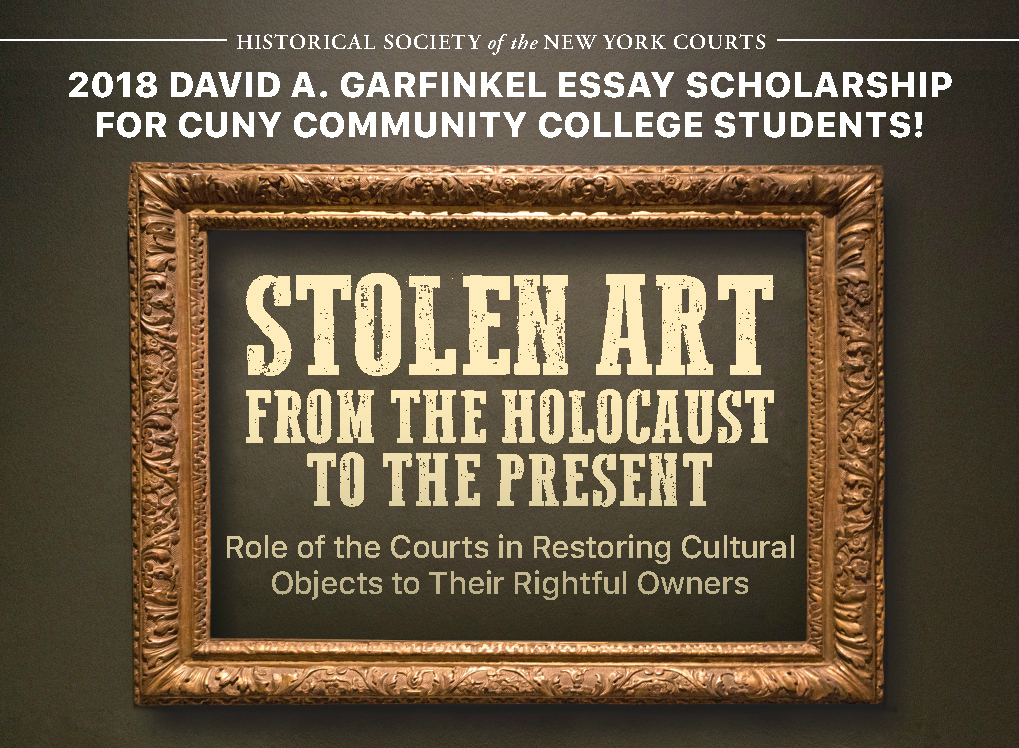The 2017-2018 cycle of the David A. Garfinkel Essay Scholarship has begun, and we’re bringing some changes to the competition! After 11 years, the Society has made the difficult decision to restructure elements of the Garfinkel Essay Scholarship, but keep some the same!
A Society Trustee developed the resources for the previous 10 cycles and decided to take a step back to let a new person manage the preparation of Scholarship materials. She has even written an article about the importance of the Scholarship for our blog. This led to the creation of the Historical Society of New York Courts Fellowship. The Fellow’s duties include developing the topic and questions, preparing materials for the Scholarship website, and conducting teacher and student workshops.
Luckily, we were able to find the perfect person for our first Society Fellow: Christine Mooney, Esq.! Christine is an attorney and Associate Professor in the CUNY Community College system. She has written for our blog before about the impact of the Scholarship on not only her students but also her professional work (Read more here). As someone deeply invested in the success of the Garfinkel Essay Scholarship, Professor Mooney developed this year’s topic: Stolen Art: From the Holocaust to the Present – Role of the Courts in Restoring Cultural Objects to Their Rightful Owners. Christine truly understands how to integrate the Scholarship into course curriculum and connect the Scholarship’s topic to a variety of disciplines while still relating to the rich legal history of New York State. All resources are now available on the Garfinkel Scholarship section of our website.
It is important to note that though Professor Mooney’s students are eligible to enter the Scholarship, contest judges are drawn from Court of Appeals staff and the Society’s Young Lawyers Committee. Essays are sent to judges without identifying information, such as name and school, to preserve the impartiality of the project. Competition judges learn about the winners only after they have been selected.
This isn’t the only major change the Society is bringing to the David A. Garfinkel Essay Scholarship this year. We have also decided to limit participation to CUNY two-year community college students. As a whole, CUNY students participate at greater numbers than SUNY students, and with the Society’s difficulty, and our new Fellow’s difficulty, to travel throughout the State for outreach, we had to make a tough decision. This change may not be permanent, and we are open to reinstating SUNY participation in future years, but at this time, we do not see a way to make participation from both school systems work effectively.
However, as some things change, others stay the same. The Society is still committed to asking students to delve into historical topics that relate to their experiences today as citizens of New York. Winners will still be honored at Court of Appeals Law Day and have the opportunity to meet with Court of Appeals judges at a winners’ luncheon. We will also be bringing back honorable mentions this year, and in a new initiative, CUNY is developing a reception a little closer to campus to honor winners and honorable mentions alike. The essays also continue to be valuable in that they can serve as writing samples as students apply for jobs or other schools.
We aren’t the only ones aware of the benefits of participating in the Garfinkel Essay Scholarship. You can read more about the impact the Scholarship has had on our inaugural winner, Elijah Fagan-Solis, on our blog. To give you an idea, here is what 2017 third-prize SUNY winner Shannon Dent had to say:
The Garfinkel Scholarship is a great way to showcase your knowledge… I was able to choose Women’s Suffrage, a topic I am very interested in. I love that awards are given out [at Law Day] to appreciate the hard work put into these essays. It is very gratifying and generous… Thank you for the opportunity.
As we adjust to the new David A. Garfinkel Scholarship, we hope to continue to inspire students to understand New York’s unique history and how it impacts their roles as citizens today. Legal history matters to all of us, and the Garfinkel Scholarship seeks to explore that.

